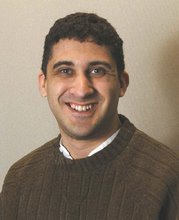IT IS IN HIS astonishing little book (173 pages of text) just published by Princeton University Press. The title, "Neighbors," is an ice dagger to the heart, but only after the book has been read. The word "neighbor" connotes moral sympathy ("neighborly") as well as physical proximity. But not on July 10, 1941, in Jedwabne.
Gross says, "This is a rather typical book about the Holocaust" because it does not offer "closure"—"I could not say to myself when I got to the last page, ‘Well, I understand now'." Perhaps he is flinching from the awful answer his book supplies. On June 22, 1941, Germany attacked the Soviet Union, which was occupying the part of Poland containing Jedwabne. On June 23 a small detachment of Germans entered the town. There were almost immediately some isolated atrocities by Poles against Jews—one man stoned to death with bricks, another knifed and his eyes and tongue cut out. German policy encouraged pogroms by local populations, and there were some ghastly ones near Jedwabne. One of the first questions asked of the Germans occupying the town was, Is it permitted to kill the Jews?
After the carnival of killing, the Germans reportedly thought the Poles "had gone overboard" and said to them, "Was eight hours not enough for you to do with the Jews as you please?" But the murderers were not socially marginal people. At a town meeting—democracy, really—Jedwabne's leaders met with the Germans. Gross quotes a witness: "When the Germans proposed to leave one Jewish family from each profession, local carpenter Bronislaw Szlezinski, who was present, answered: We have enough of our own craftsmen, we have to destroy all the Jews, none should stay alive. Mayor Karolak and everybody else agreed with his words."
The mayor coordinated the killing, but otherwise, Gross says, "people were free to improvise." Peasants from nearby villages got word of the planned pogrom and came to town as to a fair. A Pole recalls that "the Jewish population became a toy in the hands of the Poles." The Holocaust has been called a manifestation of modernity because of its industrialization of murder. But in Jedwabne hooks and wooden clubs were used. A head was hacked off and kicked around. To escape the killers, women fled to a pond and drowned their babies, then themselves. But most were burned alive in a barn while the town was searched for the surviving sick and children. A witness: "As for the little children, they roped a few together by their legs and carried them on their backs, then put them on pitchforks and threw them onto smoldering coals."
Gross estimates that half the town's men participated, and because the killings were concentrated in a space no larger than a sports stadium, everyone "in possession of a sense of sight, smell, or hearing either participated in or witnessed the tormented deaths." A murderer in uniform can resemble a cog in a machine, but the last faces seen by Jedwabne's Jews were the familiar faces of neighbors. It was, Gross says, "mass murder in a double sense—on account of both the number of victims and the number of perpetrators."
The Germans' involvement was confined to photographing events and, in one instance, offering the sort of advice professionals offer amateurs. A witness recalls that when Poles with thick clubs were battering six Jews, a watching German said, "Do not kill at once. Slowly, let them suffer."
In 1996 Daniel Goldhagen's book "Hitler's Willing Executioners: Ordinary Germans and the Holocaust" argued that German society was saturated by an "eliminationist anti-Semitism" that produced a high degree of voluntary participation in genocide. His premise—that Hitler merely unleashed a cultural latency and fulfilled the sick logic of German history—reduces Hitler's role to that of mere catalyst. Goldhagen did stress the powerful role of Third Reich propaganda. But, then, what of the Poles of Jedwabne, who were not Germans and who did their uncoerced murdering after just two weeks of German occupation, before being conditioned by propaganda?
Christopher Browning, author of "Ordinary Men," a study of middle-aged German conscripts who became consenting participants in mass-murder police battalions in Poland, argued that cruelties inflicted by the Khmer Rouge against fellow Cambodians and by Chinese against Chinese during Mao's Cultural Revolution cannot be explained by Goldhagen's model—centuries of conditioning by a single idea. Neither can Jedwabne be explained by Easter sermons characterizing Jews as God-killers, or by medieval myths about ritual murders of children by Jews, or by lust for plunder.
Gross's book accords with Browning's admonition that explanation must involve "those universal aspects of human nature that transcend the cognition and culture of ordinary Germans." Or ordinary Poles. At bottom, the explanation is not in this or that national history but in humanity as it quickly becomes when severed from social restraints.
Gross quotes, but does not sufficiently dwell on, philosopher Eric Voegelin's thoughts about "the simple man, who is a decent man as long as the society as a whole is in order, but who then goes wild, without knowing what he is doing, when disorder arises somewhere and the society is no longer holding together." Political philosophies that celebrate atomistic individualism need to be re-read in the light cast by the crematoria of Auschwitz.
The Holocaust, writes Gross, is "a foundational event of modern sensibility, forever afterward to be an essential consideration in reflections about the human condition." So, again: Why in Jedwabne did neighbors murder their neighbors? Because it was permitted. Because they could.
by George F. Will
© 2001 Newsweek, Inc.


No comments:
Post a Comment